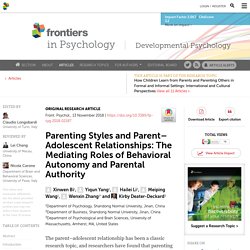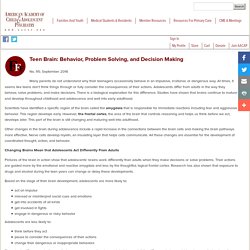

Adolescence behaviour is usually centered around the peer society, parent-adolescence relationships and conflicts between parent-child expectations. Before we explore how parents can effectively influence and shape adolescence behaviour, let's find out more about the theory behind the importance of quality parent-adolescence relationships. An Exploration of the Bases of Peer-Compliance and Parent-Compliance in Adolescence. s10964 008 9286 7. The Parent-Adolescent Relationship Scale. Parenting Styles and Parent–Adolescent Relationships: The Mediating Roles of Behavioral Autonomy and Parental Authority. Introduction Variations in parenting styles and parent–child relationship qualities are long-standing research topics in developmental and family psychology.

Previous research has shown that parenting styles are critical family context factors which are closely related to parent–adolescent relationships (Shek, 2002). Despite the large number of studies on the associations between parenting styles and parent–adolescent relationships, existing research mainly has focused on the direct effects of parenting styles on parent-adolescent relationships, while the underlying mechanisms through which parenting styles are associated with parent–adolescent relationships have seldom been examined. Teen Brain: Behavior, Problem Solving, and Decision Making. Teen Brain: Behavior, Problem Solving, and Decision Making No. 95; September 2016 Many parents do not understand why their teenagers occasionally behave in an impulsive, irrational, or dangerous way.

At times, it seems like teens don't think things through or fully consider the consequences of their actions. Adolescents differ from adults in the way they behave, solve problems, and make decisions. There is a biological explanation for this difference.